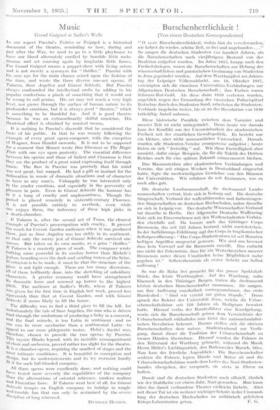Music Grand Guignol at Sadler's Wells
IN one aspect Puccini's Trittice or Triptych is a historical document of the theatre, reminding us how, during and just after the War, we used to go to a little playhouse to have our blood alternately curdled by horrible little melo- dramas and set coursing again by laughable little farces. Par Grand Guignol means a puppet-show with living actors . and is not merely a synonym for " thriller." Puccini with his sure eye for the main chance seized upon the fashion of the time, and wrote the three diverse one-act operas, It Tabarro, Suor Angelica and Gianni Schicchi. But Puccini always confounded the intellectual snobs by adding to his Popular confections a pinch of something that it would not be wrong to call genius. His art may not reach a very high level, nor pierce through the surface of human nature to its Profounder emotions, but it is always good " theatre," which is something to be thankful for. And it is good theatre because he was an extraordinarily skilful musician. His theatrical effect is obtained by musield means.
It is nothing to Puccini's discredit that he considered the task, of his public. In that he was merely following the example of every great opera-composer, with the exception of Wagner, from Handel onwards. It is not to be supposed for a moment that Mozart wrote Don Giovanni or The Magic Plate with one eye upon posterity. The essential difference between his operas and those of Salieri and Cimarosa is that they are the product of a great mind expressing itself through music. The flaw in Puccini was precisely that his mind Was not great, but warped. He had a gift or instinct for the delineation in music of dramatic situations and of character as keen as any man's. Unhappily he Was interested only in the cruder emotions, and especially in the perversity of Pleasure in pain. Even in Gianni Schicchi the humour has in it a tang of cruelty and unpleasantness. Though the Period is placed remotely in sixteenth-century Florence, it is not possible entirely to overlook, even while °fie enjoys ' them, the indecency of these high jinks in a death-chamber.
Il Tabarro is, after the second act of Tosca, the clearest example of Puccini's preoccupation with cruelty. It proved tOo much for Covent Garden audiences when it was produced there, just as Suor Angelica was too sickly in its sentiment, so that only the merry jest of Gianni Schicchi survived one season. But taken on its own merits, as a grim " thriller," rl Tabarro is a masterly piece of work. The composer wrote nothing more powerful in its sombre horror than Michele's jealous brooding over the dark and swirling waters of the Seine. If criticism is to be made, it must be that the structure of the Piece is not tight enough. There are too many diversions, all of them brilliantly done, into the sketching of subsidiary characters. A greater economy would have strengthened its dramatic force and screwed up horror to the highest Pitch. The audience at Sadler's Wells, where II Tabarro Was given for the first time in English last week, proved less squeamish than that at Covent Garden, and with Gianni Schicchi it seems likely to fill the houke.
The difficulty was to find a third piece to fill the bill, for unfortunately the tale of Suor Angelica, the nun who is driven Iliad through the misfortune of producing a baby in a convent, 414 the final miracle, is too Latin in sentiment—and no one can be more saccharine than a sentimental Latin—to hPPeal to our more phlegniatie tastes. Hoist's Savitri was, therefore, chosen to precede the two operas by Puccini. This mystic 'Hindu legend, with its invisible accompaniment of choir and orchestra, proved rather too slight for the theatre. It is a chamber-opera, requiring the smallest of stages and the most intimate conditions. It is beautiful in conception and design, but its understatements and its icy restraint hardly fit it for such full-blooded company.
, All three operas were excellently done, and nothing could 'lave tested more severely the capabilities of the company than the alternations of oriental reticence, modern realism mid Florentine farce. 11 Tabarro went best of all, for Gianni 8Miecki tempts an English company to indulge in rough- aad-turnble fun that can only be restrained by the SCVCIN.'. (liscipline of long rehearsal.
DYNIMEY Hussay.


























































 Previous page
Previous page